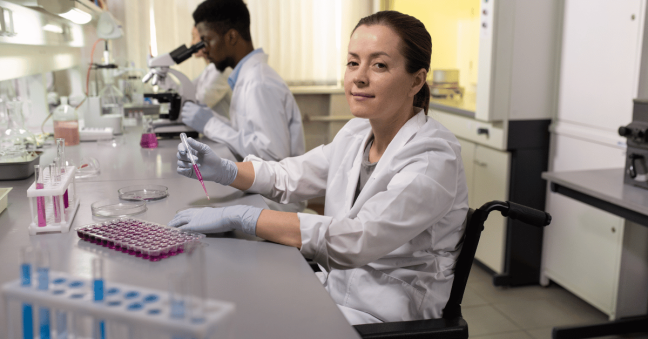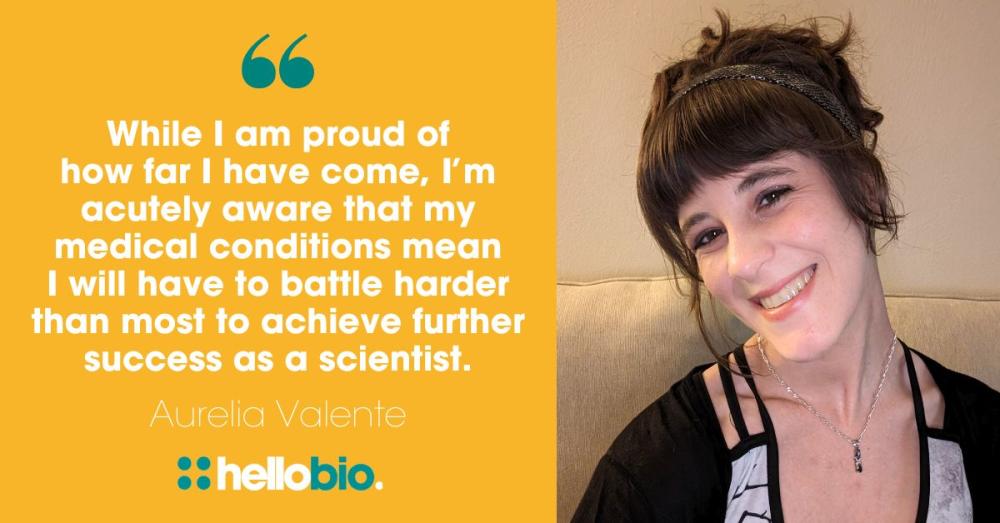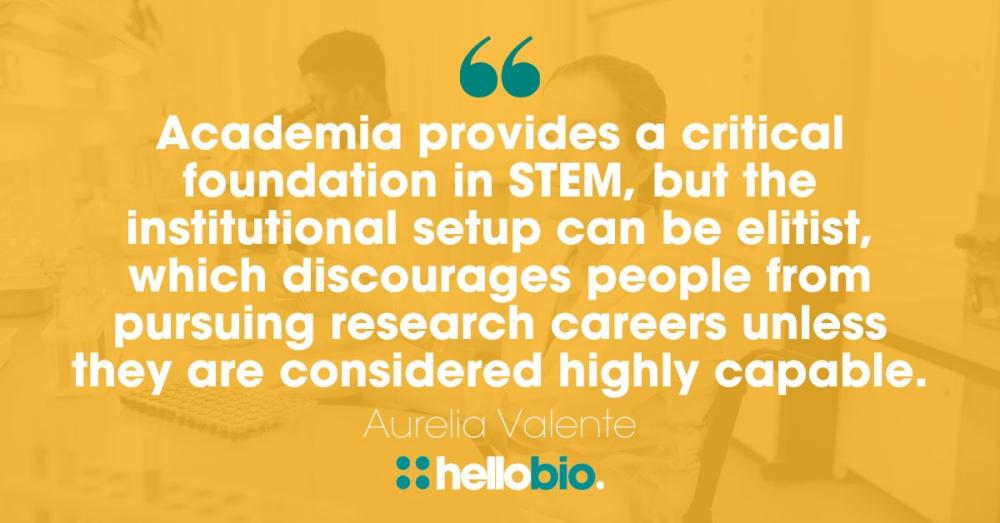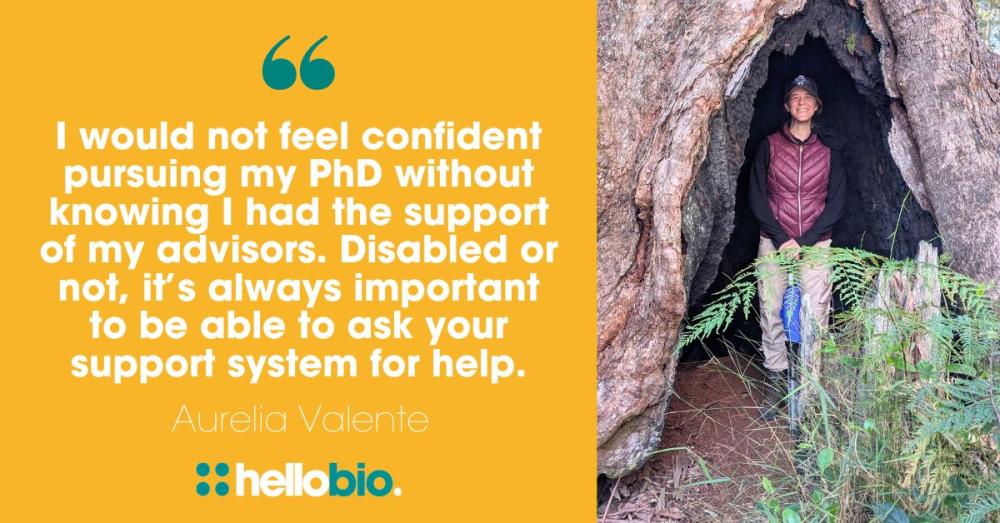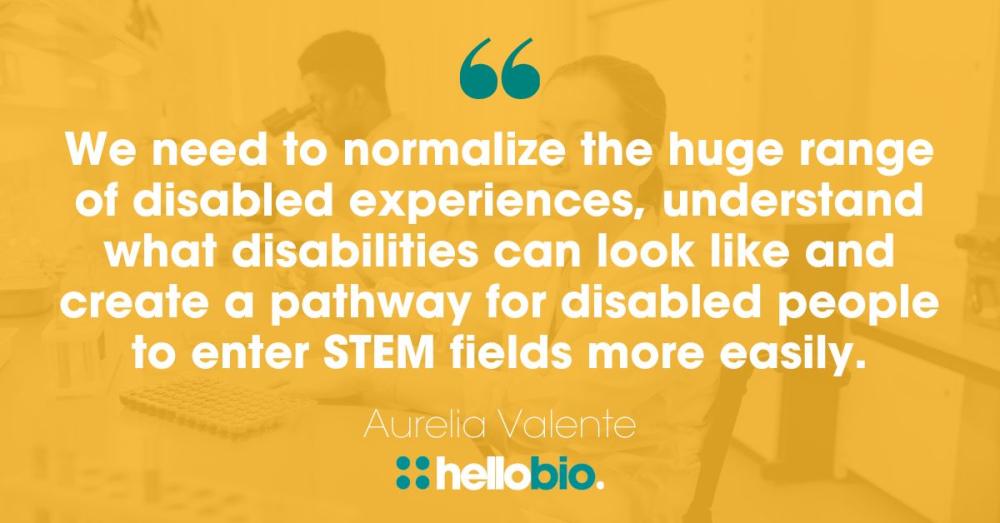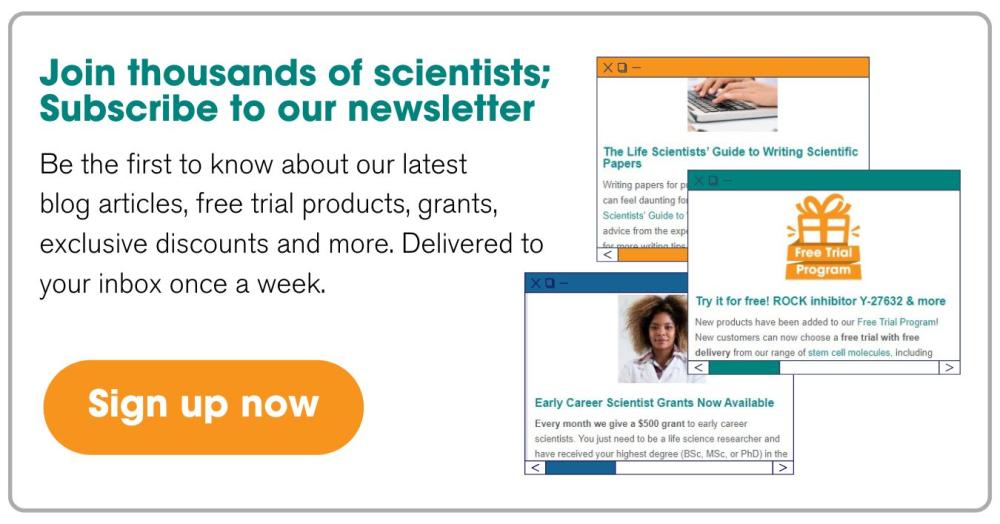Creating a More Inclusive Future for Disabled Scientists
In the world of STEM research, disabled scientists are hugely underrepresented within the workforce. Currently, just 3% of working scientists are disabled, and those that do pursue science careers can face significant barriers with regard to career progression. Lack of awareness, inaccessible working environments and archaic stigmas are just some of the issues that can discourage people with disabilities from studying and working in the field of science.
Aurelia Valente is a PhD student and comparative behavioural biologist at the University of New Mexico, USA. She has a number of medical conditions that affect her daily life, and is a passionate advocate for disabled voices in STEM. In this guest article, she considers some of the factors that can deter disabled people from pursuing science careers, the importance of awareness and understanding amongst lab colleagues, and the simple accommodations that could drastically improve the working lives of disabled researchers and make STEM more inclusive for all.
________________________________
Becoming a scientist
When I was in 7th grade, I saw a diagram of a cnidarian's life cycle. I found the strange cycle incredibly unique, and fascinating. That was where the organized chaos of biology first truly captivated me. I have been hooked ever since.
My science career has taken a varied path. After receiving my B.S. in Integrative Biology, I went from field work in Peru to teaching high school biology and beginning a Master’s degree focused on adaptability and accessibility in biological education, communication, and research. Now, I am working towards a Ph.D. in the same field I fell in love with at age 12. And while I maintain my passion, it has also been a journey filled with physical challenges I am constantly learning to negotiate. While I am proud of how far I have come, I am acutely aware that my medical conditions mean I will have to battle harder than most to achieve further success as a scientist.
Physical challenges
I have a genetic, systemic condition called hypermobile Ehler-Danlos Syndrome (hEDS) which is a connective tissue disease and a collagen disorder. It can affect everything in my body, from my joints to my nerves to my digestive tract. I was diagnosed last year, having struggled with symptoms for my entire life, and have undergone hip and jaw reconstruction surgeries. Along with hEDS, I also have a dysautonomic condition called postural tachycardia syndrome (POTS) which can cause me to faint. I also suffer from migraines, scoliosis, GI issues, and a variety of other medical conditions related to EDS. I use mobility aids like a cane, and I have a permanent disability placard. My disabilities are dynamic, which means my needs and abilities can change from day to day. The variability of my pain can create incredible challenges as I move through the world as a disabled scientist.
As a high school teacher, I loved my work, but I found the strict routine and expectations associated with that job difficult to manage because of my progressing health conditions. Higher education isn't necessarily easier, but at least I have more choices in building my schedule, and a stronger support system from the university. Field work can also pose unique challenges for me, and it is something that I have to deeply consider and manage as I explore this next phase of my career. For a biologist, being unable to do as much field work as I want to is far from ideal. Even in the lab, research is often productivity-oriented, and there is a lot of pressure to constantly produce results. It can be hard to ask for time to rest and recover, especially if you are operating in a limited time window, or with limited funding.
I have worked incredibly hard this past year to reach a position where I hope my disability will not delay my education any further. Despite my struggles, I know I am capable of achieving my goals. I am extremely determined and will always continue to find a way forward. I am also very lucky to have support from my partner and family, but it is not easy, and sadly for many disabled scientists, barriers like these can be incredibly difficult to overcome.
Lack of inclusion in academia
There are very few disabled people working in scientific research, and I think this is definitely a multi-faceted issue. Academia provides a critical foundation in STEM, but the institutional setup can also be elitist, which discourages people from pursuing research careers unless they are considered highly capable. Don't get me wrong; we want smart people doing research, but a lot of good science comes from determination and innovation that goes beyond basic measured intelligence. But new ideas often come from a wide range of diverse backgrounds, experiences, and perspectives, so discouraging diversity limits our own progress. And while this is improving in some areas, there are still many barriers to achievement for many marginalized scientists.
Making accommodations is key to success
Disabled people have made a lot of crucial contributions to science, but their disabilities are often minimized. There is a false narrative that you have to "overcome" your disability in order to succeed as a scientist. But often what you actually need are accommodations. Unfortunately, employers in most fields are extremely resistant to making even the simplest accommodations. Many of these sentiments stem from inherent bias; disabled researchers often don’t receive as much funding, because there is an outdated mindset that they can't achieve as much because of certain limitations. These archaic stereotypes push people out of the field.
Unfortunately, as a disabled researcher, I also see attempts to encourage inclusion that do not incorporate real perspectives. Many disabled people actually prefer identity-first language, rather than person-first language, because disabilities are an inherent part of our existence. But we are ignored, because we are told that our "disabilities should not define us." This type of rhetoric can be discouraging across many fields, but absolutely occurs in STEM. Inclusion needs to recognize and respect the perspective and experience of the individual, since we are all unique.
Additionally, if you are a member of any other marginalized groups, the impact of having a complex identity can be compounded. I am a woman, and I am queer. Those identities pose their own daily challenges, such as navigating issues like sexism in the workplace. I am not a person of color, but racism is also definitely a problem in science, and having multiple identities can have even greater impacts for disabled POC.
Awareness, understanding & visibility
For a disabled person to thrive in a STEM career, awareness and understanding amongst colleagues and peers is absolutely critical. Human beings are social creatures, and we rely on each other for support. When you have innate challenges because of a disability, you rely on others in more ways than people sometimes expect. As a highly independent person, this is something I am still working to come to terms with.
It can be challenging to explain the many, many ways that a disability can affect you, and it is far more difficult for others to understand what having a disability really means. Every disabled person is different and unique, so our challenges will look very different for each individual. But we often rely on our accommodations, so if we don't have support from the people around us, we can become very limited in what we can do. It is incredibly difficult to have confidence in your own abilities if you are constantly dealing with misconceptions and judgements from the very people who should be supporting you.
Asking for help when needed
I often struggle to explain the challenges associated with limitations in autonomy as a disabled person. I have always valued my independence, so asking for help can be a big challenge for me, but there are a lot of things I can't do without support. I went to Australia this summer for my MA program with Project Dragonfly, and I probably wouldn't have been able to do that without a lot of support from the people involved in the program. I also would not feel confident pursuing my PhD without knowing I had the support of my advisors. Disabled or not, it is always important to have support from colleagues, peers, and friends, and to be able to ask your support system for help.
Small changes that can make a big difference
There are several accommodations I rely on as a disabled researcher. As a student, I need extended testing time, the ability to move around if I need to, and some flexibility with attendance and assignment due dates. As an employee, having choice and flexibility in my schedule, technology to help me do certain tasks more easily, and pre-set limitations (like agreeing that someone else needs to do the heavy lifting in the field), can all help to make my working life considerably easier.
It helps me a lot to be able to move between different tasks if I need to, and to work closely with my advisor or supervisor to decide what is realistic for me and for the job. Understanding, compassion, and communication are critical, and both parties need to be aware of the expectations in any job. Accommodations are unique to every disabled person, and can vary considerably, but making and honoring them is often a lot easier than you might think. Accommodations are designed to help someone be more productive, not be expensive or create challenges for an employer. It is important that people treat accommodations seriously, and with respect.
A more inclusive future for disabled scientists
Improving conditions for disabled scientists means that we need to normalize the huge range of different disabled experiences, understand what disabilities can look like and create pathways for disabled people to enter STEM fields more easily. Reducing financial and physical barriers can have a huge impact on getting people into science. This type of study has been a large part of my MA. Increasing access and getting people involved requires us to adapt our information to peoples' learning needs, and work on increasing physical access to nature and science.
I also think training and professional development can be incredibly beneficial, but it needs to be designed in a way that is easy and accessible for everyone and emphasizes real impact. I also think that we need to boost incentives for increasing access to jobs and cultivate an environment in the sciences where people aren't afraid to share their experiences for fear of retaliation, such as losses in funding and competitive positions.
Embracing diversity
Everyone has unique identities and experiences, and it is important not to minimize a person's experience, or what they are capable of contributing. If someone wants to be a scientist, they deserve to be offered that opportunity. Part of getting people to become scientists means getting them excited about science, and it baffles me how much science can discourage diversity, especially in biology. We are a field known for the word "biodiversity" so studying ‘diversity’ is literally in the job description!
Moving forward, I hope to see a lot more disabled people advocating for their needs, getting accommodations, and finding success in STEM fields. I would love to see so much more diversity in the sciences and move away from biases that affect funding and employment.
People should be able to pursue their passion, in whatever form that takes. We all contribute to the scientific atmosphere; if we want to genuinely make advancements, then it is absolutely crucial that we work to build a supportive community, where passion for science can truly thrive.
Connect with Aurelia Valente
- LinkedIn: Aurelia Valente
________________________________
Additional resources from Hello Bio
For more articles on diversity and inclusion in STEM, take a look at these articles on the Hello Bio blog:
- Promoting Diversity in STEM Online - guest blog by Mackenzie Lemieux and Rebecca Zhang
- Gender Bias from a Woman in Science - guest blog by Kay M. Tye
- Overcoming Challenges as a Woman in STEM - guest blog by Gagandeep Kaur
- Supporting Women in STEM - Resources for Female Researchers
- 10 Award-Winning Black Scientists You Should Know About
- Ten LGBTQ+ Scientists You Should Know About
- How Can We Increase the Visibility of LGBTQIA+ Researchers in STEM? - guest blog by Ray Das
________________________________
If you enjoyed this article, why not check out the other resources available on our blog. We are passionate about supporting life scientists including early career life scientists and PhD students - with really low-priced reagents, antibodies and biochemicals, early career scientist grants, and resources to help with both personal and professional development. We know how tough it is - so we hope you find these helpful!
More General Support for Life Scientists
For advice on wellbeing, dissertations, presenting at conferences, wellbeing, PhD support, networking and lots more, we have a huge range of articles to help - just click below:
Save up to 50% on our high purity reagents...
When you get to the stage of planning your experiments, don't forget that we offer a range of low-cost, high-purity agonists, antagonists, inhibitors, activators, antibodies and fluorescent tools (yes - they really are around half the price of other suppliers!) You can use our Quick Multi-Search Tool to search for lots of products in one go, and the range includes:
- Enzyme inhibitors and activators
- Chemogenetic ligands
- Ion channel modulators
- GPCR & ionotropic receptor ligands
- Cell biology reagents & biochemicals
Technical resources
Try our Molarity Calculator: a quick and easy way to calculate the mass, volume or concentration required for making a solution.
Try our Dilution Calculator: an easy way to work out how to dilute stock solutions of known concentrations
We also offer a comprehensive range of technical resources including antibody protocols and methods, product guides and mini-reviews:
And finally, don't forget to check back in with our blog regularly for our latest articles. If there’s something you’d love to contribute to the community, whether that’s an interview or article, drop us a line at hello@hellobio.com
---





